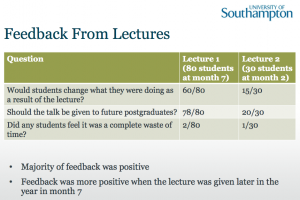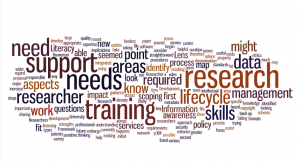Institutional alignments for progressing research data management
Can visualisation of alignments – of people and ideas across an institution – reveal and predict progress towards research data management (RDM)?
DataPool has been seeking to institute formal RDM practices at the University of Southampton on three fronts – policy, technical infrastructure, and training – as we have noted before. In addition, the university has a longer-term roadmap looking years beyond the point reached in DataPool.
One aspect of this work we haven’t addressed is the alignments that have been instrumental in making progress on these three fronts. It follows that if we can visualise these alignments then not only does this chart progress but it may reveal new alignments that need to be forged looking forward, and where there may be gaps in existing alignments there could be lessons for future progress. Since in terms of these alignments the University of Southampton may be distinctive but not unique, this analysis might extend to other institutional RDM projects. That is the idea, at least, behind the latest DataPool poster presentation, shown below, prepared for the final JISC MRD Programme Workshop (25-26 March 2013, Aston Business School, Birmingham).
Within DataPool we have established formal and informal networks of people that connect with and cross existing institutional forums. For example, the project has close and regular contact with an advisory group of disciplinary experts, has established a network of faculty contacts, has been working with the multidisciplinary strands of the University Strategic Research Groups (USRGs), and with senior managers and teams in IT support (iSolutions) and Research and Innovation Services (RIS). At the apex, we have a high-level steering group that spans all of these areas with in addition senior institutional managers (Provost, Pro-VC) as well leaders from external data management organisations. A series of case studies provide insights into the current data practices and needs of those researchers who are data creators and users.
Returning to the three fronts of our investigations, we have reached either natural and expected conclusions ready to be taken forward beyond DataPool, or in some cases incomplete and possibly unexpected conclusions. Below we reveal and assess the alignments that have driven progress on these three fronts:
Policy. Approved by Senate, the University’s ‘primary academic authority’, following recommendations from the Research and Enterprise Advisory Group (REAG), and officially published within the University Calendar. This alignment did not happen by chance, but began to be formed by the library team through the IDMB project and was taken forward within DataPool. Supporting documentation and guidance for the policy is provided on the University Library web site. The policy is effective from publication, but with a ‘low-profile’ launch and follow-up it has by design not had widespread impact on researchers to date.
Data infrastructure. Research data apps for EPrints repositories, with selected apps installed on ePrints Soton, the institutional repository, which is now better structured for data deposit. Progress made with initial interfaces in Sharepoint, the university’s multi-service IT support platform, to describe data projects and facilitate data deposit; some user testing, but currently remains incomplete. On storage infrastructure it has not been possible to cost extensions to the existing institutional storage provision, a limitation in extending data services to large and regular data producers, who by definition are the most active data researchers. One late development has been to embed support for minting and embedding DataCite DOIs for data citation in data repositories at Southampton.
Training and support. Principally extended towards PhD and early career researchers, and in-service support teams in the library. Plans to embed RDM training within the university’s extended support operations across all training areas, Gradbook and Staffbook. One highlight in this area is the uptake of support for data management planning (DMP), particularly at the stage of submitting research project proposals for funding.
In these examples we can see alignments spanning governance-IT-services-users.
From the brief descriptions of these fronts it can be seen that the existing alignments have brought us forward, but to go further we have to return to those alignments and reinforce the actions taken so far: to widen awareness, impact and uptake of policy; to provide adequate and usable RDM infrastructure for data producers; to develop and integrate training support within the primary delivery channels.
Almost all of these outcomes and the need for more follow-through can be traced to the alignments. However, the elusive element common across these alignments is the researcher and data producer, despite being a perennial target. Data initiatives, whether from institutions or wider bodies such as research funders, start out with the researcher in mind, but can lose momentum if the researcher appears not to engage. That may be because the benefits identified do not align with the interests of the researcher, or it may be because at a practical level the support and resources provided are insufficient. Thus the extended alignments required for full RDM do not materialise. Worse, the existing alignments can be prematurely discouraged, lack incentives and confidence to promote the real innovation they have delivered, in turn affecting investment decisions and service development.
Where the researcher is engaged the results can be quite different, as seen in the DataCite example, motivated and developed by researchers, and in DMP uptake, where researchers clearly begin to recognise both the emergence of good practice in digital data research and the need for compliance with emerging policy.
These alignments are a crucial but largely unnoticed aspect of DataPool, and no doubt of other similar #jiscmrd projects at other institutions as well. If this analysis is correct then for institutional-scale projects alignments can both reveal and predict progress.


